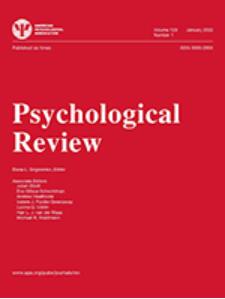识别风险选择的资源理性启发式方法。
IF 5.1
1区 心理学
Q1 PSYCHOLOGY
引用次数: 0
摘要
由于计算资源有限,人们几乎总是无法做出完全理性的决策。取而代之的是,人们可能会依赖于通常能产生良好结果的计算节俭启发式方法。尽管之前的研究已经发现了很多这样的启发式方法,但发现好的启发式方法并预测它们何时会被使用仍然具有挑战性。在这里,我们提出了一个理论框架,通过考虑如何充分利用有限的认知资源,我们可以利用机器学习的方法自动得出在任何给定情况下使用的最佳启发式。为了证明我们的方法的通用性和准确性,我们将其发现的启发式方法与人们在广泛的多属性风险选择环境中使用的启发式方法进行了比较。我们的方法重新发现了已知的启发式策略,将其确定为特定环境下的合理策略,并发现了之前被忽视的新型启发式策略。我们的研究结果表明,尽管人们的决策策略选择并不总是能够充分利用环境结构,但他们的决策策略能够适应环境结构,并且通常能够很好地利用有限的认知资源。(PsycInfo Database Record (c) 2024 APA, 版权所有)。本文章由计算机程序翻译,如有差异,请以英文原文为准。
Identifying resource-rational heuristics for risky choice.
Perfectly rational decision making is almost always out of reach for people because their computational resources are limited. Instead, people may rely on computationally frugal heuristics that usually yield good outcomes. Although previous research has identified many such heuristics, discovering good heuristics and predicting when they will be used remains challenging. Here, we present a theoretical framework that allows us to use methods from machine learning to automatically derive the best heuristic to use in any given situation by considering how to make the best use of limited cognitive resources. To demonstrate the generalizability and accuracy of our method, we compare the heuristics it discovers against those used by people across a wide range of multi-attribute risky choice environments in a behavioral experiment that is an order of magnitude larger than any previous experiments of its type. Our method rediscovered known heuristics, identifying them as rational strategies for specific environments, and discovered novel heuristics that had been previously overlooked. Our results show that people adapt their decision strategies to the structure of the environment and generally make good use of their limited cognitive resources, although their strategy choices do not always fully exploit the structure of the environment. (PsycInfo Database Record (c) 2024 APA, all rights reserved).
求助全文
通过发布文献求助,成功后即可免费获取论文全文。
去求助
来源期刊

Psychological review
医学-心理学
CiteScore
9.70
自引率
5.60%
发文量
97
期刊介绍:
Psychological Review publishes articles that make important theoretical contributions to any area of scientific psychology, including systematic evaluation of alternative theories.
 求助内容:
求助内容: 应助结果提醒方式:
应助结果提醒方式:


